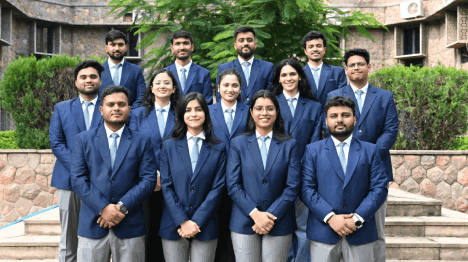- About Us
-
Academics
Schools
Programs
General Information
-
Faculty
The faculty members and researchers working at IIHMR University come from varied backgrounds including, but not limited to medicine, public health, management, economics, statistics, demography, human geography, social and behavioral sciences, rural development and pharmaceuticals.
-
Admissions
- Research
Publications & Journal
- Executive Education
Executive Programmes
- Online Certification Courses
ONLINE CERTIFICATION Courses
- Training
- Placements
- Contact
- Pradanya
- Blog
- Fee Payment
- NAAC
- IQAC
- NIRF
-
About Us
- About IIHMR University
- Board of Management
- Academic Council
- Board of Studies
- Research Board
- Institutional Review Board
- Finance & Audit Committee
- Departmental Research Committee
- Chairperson's Message
- President's Message
- IIHMR University Act
- Infrastructure
- Collaboration
- Ranking
- Board of Studies (School of Digital Health)
- Awards & Accolades
-
Academics
- Institute of Health Management Research
- School of Pharmaceutical Management
- ML Mehta School of Development Studies
- School of Digital Health
- SD Gupta School of Public Health
- MBA (Hospital and Health Management)
- MBA (Pharmaceutical Management)
- MBA (Development Management)
- MBA (Healthcare Analytics)
- Master of Public Health
- Student Manual – Cohort 9 (2021-2023)
- Master of Public Health (Offered by Johns Hopkins Bloomberg School of Public Health, USA in cooperation with IIHMR University, Jaipur, India)
- Ph. D.
- MBA CSR & ESG Management (Executive)
- MBA Sustainable Business Management (Executive)
- Common Information for all the Programs
- Academic Calendar
- Student Handbook 2020-21
- Committees
- Policies
- Annual Exam Calendar
- Library
- Faculty
- Officers of University
- Dean of Institute of Health Management Research
- Dean of School of Pharmaceutical Management
- Dean of School of Development Studies
- Dean of SD Gupta School of Public Health
- Dean of School of Digital Health
- School of Digital Health
- Faculty List A to Z
- Faculty List Designation Wise
- Faculty List School Wise
- Admissions
- Research
- Executive Education
- Training
- Placements
- Alumni
- Events
- Job Openings
- Contact
- Research
Study on Global Ageing and Adult health (SAGE)- India 2006 in Rajasthan and Uttar Pradesh
Agency : IIPS, Mumbai
The Study on Global Ageing and Adult health (SAGE) India, 2006 was initiated by the World health Organization in six of the seventy countries that participated in the World health survey, 2003. SAGE is a longitudinal, cross-sequential household face-to-face survey. The current survey was the first baseline for SAGE survey programme. The SAGE results intended to inform how health, social, environmental and economic policies, programmes and realities across different countries affected the health status of individuals and populations over a life time and at old age. Institute of health Management Research (IhMR), Jaipur conducted the field work for SAGE, India in the state of Rajasthan.
The overall objectives of SAGE 2006 were; a) to strengthen India's demographic and health database by estimating reliable state-level of population, maternal and child health, hIV/AIDS, and nutrition; b) to facilitate evidence-based decision making in population, health and nutrition; and c) to strengthen the survey research capabilities of Indian institutions and to provide high quality data to policy makers, family welfare and health programme managers, government agencies, NGOs, international agencies, and researchers.
SAGE 2006 provided information on; a) the estimates of the levels of fertility, infant and child mortality, and other family welfare and health indicators by background characteristics at the national and state levels; and b) the measurement trends in family welfare and health indicators over time at the national and state levels.
Sage-2006 also intended to provide information on several new and emerging issues including: a) perinatal mortality, male involvement in family welfare, adolescent reproductive health, high-risk sexual behaviour, family life education, safe injections, tuberculosis, and malaria; b) family welfare and health conditions among slum and non-slum dwellers.



